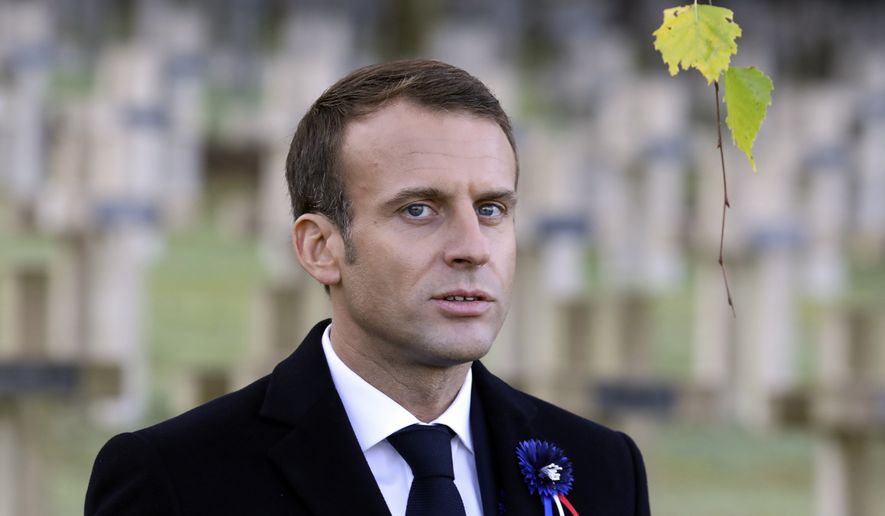French President Emmanuel Macron is once again stoking debate over the need for a Europe-wide military force to defend against an increasingly aggressive Russia, a force that critics fear could undercut and compete with the transatlantic NATO alliance.
Mr. Macron in a radio interview this week voiced the need for a “true European army” to fortify the continent’s eastern borders against an increasingly assertive Russia, as well as to deal with more unlikely threats in the years ahead.
“We have to protect ourselves with respect to China, Russia and even the United States of America,” Mr. Macron told Europe 1.
Citing the Trump administration’s souring view on NATO, particularly Mr. Trump’s constant pressure for higher defense spending and the clash over the Iran nuclear deal, Mr. Macron said European powers such as France and Germany have been left with no other choice but to create a joint military force of their own.
“We will not protect the Europeans unless we decide to have a true European army,” he said, adding, “We need a Europe which defends itself better alone, without just depending on the United States, in a more sovereign manner.”
His comments come days before Mr. Trump and Russian President Vladimir Putin are slated to join Mr. Macron in Paris for ceremonies to mark the 100th anniversary of the end of World War I.
Mr. Macron’s comments are not the first time European leaders to have floated the need for a separate force from NATO to deal with ongoing security threats. German Chancellor Angela Merkel suggested last May that Western Europe needed to accept the fact it may have to stand alone against Russia and other potential adversaries, a sign of the deep divide between Europe and the Trump administration on issues ranging from trade and climate change to Iran and Russia.
“The era in which we could fully rely on others is over to some extent,” the German leader said at the time. Give Mr. Trump’s “America first” foreign policy, she suggested, “we Europeans truly have to take our fate into our own hands.”
Since Mrs. Merkel’s comments, U.S.-NATO tensions have eased. Despite an at-times contentious alliance summit in Brussels in July, NATO officials say alliance members are making progress toward Washington’s demand that each nation contribute a minimum of 2 percent of GDP to the collective defense.
But Mr. Trump’s decisions to withdraw from the Iran deal, and a more recent announcement that the U.S. will pull out of a major nuclear weapons pact with Russia, have rattled European leaders. They fear the end of the 1987 Intermediate-range Nuclear Forces Treaty (INF) will revive divisive fights of the 1980s over the stationing of tactical nuclear weapons in and aimed at Europe.
Washington says it is the Kremlin which has violated the INF and that the treaty does nothing to constrain the arsenals of other potential rivals such as China.
But the decision to withdraw from the missile pact was yet another sign that U.S. defense and national security priorities under the Trump White House no longer meshed with those of its European allies, Mr. Macron said.
“When I see President Trump announcing that he’s quitting a major disarmament treaty which was formed after the 1980s Euro-missile crisis that hit Europe, who is the main victim? Europe and its security,” he said.
Mr. Macron tried to cultivate a personal relationship with Mr. Trump after the 2016 election, but has been increasingly critical of key Trump foreign policy initiatives in recent months, defending the Paris climate accord and criticizing Mr. Trump’s decision to move the U.S. Embassy in Israel to Jerusalem.
The EU late last year created a multibillion-dollar joint defense fund, and has already created a nine-country rapid-reaction force outside of the NATO structure.
The debate over a European army could also be affected by the imminent departure of the United Kingdom from the European Union.
Brexit means that Britain, long a skeptic of the idea, will no longer be at the table when the issue is discussed.
• Carlo Muñoz can be reached at cmunoz@washingtontimes.com.




Please read our comment policy before commenting.